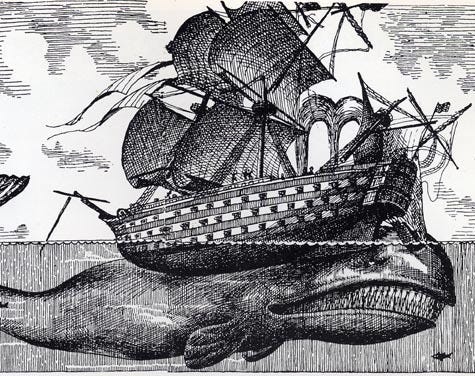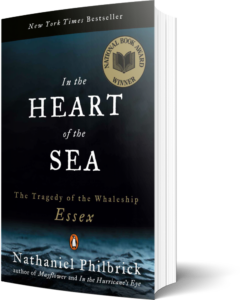In the Heart of the Sea
If you want a page turning lost at sea true story adventure this is it!
I was looking for something I couldn’t put down over Christmas break. I found it with In the Heart of the Sea, But be warned, it’s not exactly a feel-good story. Everybody has heard of Moby Dick, right? Crazy Sea Captain vs Angry Whale, this book is the true story that inspired Melville’s classic.
The story in a nutshell: In the 1800s, Nantucket was the world’s whaling capital. Twenty-one sailors pile into the Essex for a two to three-year voyage. They make it all the way to the middle of the Pacific Ocean and are successfully hunting a pod of whales when an 85-foot male sperm whale goes bat-shit crazy and rams the boat broadside. The massive creature hits the boat hard enough to stun itself, sending all the shipmates tumbling head over heels. Eventually, the whale comes to and swims away. The ship, though taking on water, remains afloat. Suddenly, the whale decides that he wants one more crack at the murderers of his kind, so he aims for a hit straight on. The strike is hard enough to reverse the vessel’s direction, causing the aft to become swamped. This extra flooding, combined with significant damage to the bow and the holes punched from the initial blow, proved too much for the craft to stay upright. The men climb aboard three small row boats, and after three days of salvaging the wreck, they make a fateful decision. They can either head west with favourable winds for a few hundred miles and try to land on some Pacific Islands, or they can turn around, battle unfavourable winds and travel 4000 miles back to the coast of South America. After much discussion, they opt for South America, mainly because they had heard rumours that the islands they would be aiming for were occupied by cannibalistic natives. They thought it better to take their chances on the high seas than risk being eaten alive. It turns out the cannibal rumour was false, and in a cruel twist of fate, to survive the great distance back to South America, they end up having to eat each other. At first, the ones who die naturally are consumed, but then, as things become more desperate, they draw lots for who lives and who is eaten. Miraculously, eight sailors survive the ordeal.
Angry Whales are a thing — Whales were hunted without restriction or mercy for a few hundred years. Eventually, the normally docile creatures decided to fight back in at least a dozen recorded cases.
It’s all in the name — Right whales were hunted to the point of extinction. Why, you ask? Because they were the right whales to hunt. Yes, that is how they got their name! Sperm whales were next on the hunt list. The cavernous head of this creature was chuck full of the coveted whale oil; when drained from the mighty beast, it looked to the horny sailers like sperm, hence the name.
Unlucky Captain — George Pollard was the captain. It was his nephew who drew the short straw and allowed himself to be eaten so the others in the boat could live. Years later, a story emerged that a visitor to Nantucket approached Pollard and, not knowing who he was, asked after the nephew. “Know him?” Says the captain, “Why I ate him!” This story is almost certainly false, but it stuck. The captain sank a second vessel off the coast of Hawaii and was never given another commission.
Was it racism or nutrition? The five black sailors died first and were eaten. Why did the whites live longer? Was there a sinister racist plot afoot? The author points out that on the whaling vessel, there were three classes. The officers, the Nantucketers, and the offshore green hands who happened to be mostly black. The officers ate the best food, the local kids the second best, and the off-shore blacks the worst food. The blacks did not have near the nutritional reserves; the whites did at the beginning of the starvation, so they died first. The lower class on the boat got paid less, slept in worse quarters, and ate less. It was more an issue of class than race. Nantucketers were among the most progressive on freedom for blacks and equality for women.





